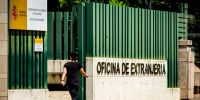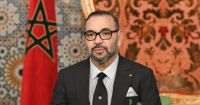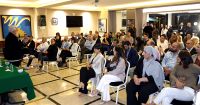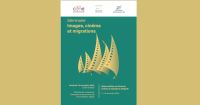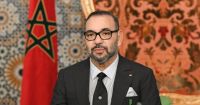DRESDEN, Germany A middle aged man waved his sign in front of television cameras and snorts to whoever will listen: The idiots in Berlin called us Nazis. Ha.
His sign read: “Injustice. Our government is sucking up to Islam.”
It was one sign and one voice, but it came at a rally Monday of thousands of people in the German city of Dresden that has officials of this country very nervous. Modeled on the old East Germany “Monday demonstrations” that began 26 years ago and eventually led to the fall of the Berlin Wall, the turnout on this Monday was an indication of the anti-Muslim ferment wracking this country.
Politicians here and elsewhere in Europe worry that the populist fervor on display here will overshadow the narrative they want to drive in the wake of last week’s Paris attacks that killed 17: that the enemy is extremism, not religion.
Germany has actively dissuaded this rally. Nearby businesses turned off their outdoor lights to leave it in the dark. Earlier Monday, German Chancellor Angela Merkel, in Berlin, had noted, “Islam is part of Germany.”
And her justice minister a day earlier had labeled the Dresden demonstrations as “disgusting” and called for this one to be canceled, out of respect for the victims in Paris.
Those calls were ignored. Estimates of the crowd ranged from 25,000 to 40,000, but even the low numbers indicated that the weekly events – there’ve been 11 previous ones, sponsored by Patriotic Europeans Against the Islamization of the West – are growing. And Monday night was a particularly windy and chilly one.
PEGIDA, as the movement is known by its German acronym, has been labeled neo-Nazi by its opponents. Its supporters say it merely plays to sensible working class concerns. Werner Patzelt, a Dresden Technical University political scientist and the acknowledged expert on the movement, calls in “the German tea party,” with many of the same concerns, underpinning a distrust of the media.
The movement has its equivalents elsewhere in Europe and shares an anti-immigration, anti-European Union and anti-establishment agency with French National Front and the United Kingdom’s Independence Party.
“What happened in Paris last week is the wind beneath their wings,” Patzelt said. “They’re feeling that now others won’t be able to ignore what they’ve been saying” – that Islam is a threat to Europe.
For 70 years, Germans, ashamed of their Nazi past, have shied away from such confrontational political stances, knowing that the politics of anger had led them in their dark decades to six million Jews murdered and the beginning of World War II.
But that’s changed, Patzelt said, adding that even in a city like Dresden, with a very small immigrant and even smaller Muslim population, populist fears building, just as they have been in the rest of Europe for a decade or more.
“They feel their nation is being flooded by asylum seekers, and they don’t believe the civil wars creating those asylum seekers show any signs of ever ending,” Patzelt said.
Certainly, there was an element of “I told you so” in Monday’s march, just days after the end of a Paris siege that began with the slaughter of 12 at the officers of the satirical newspaper Charlie Hebdo and included later murders of a suburban policewoman and four Jewish hsotages.
“Paris is another proof of PEGIDA’s right to exist,” said Lutz Bachmann, the founder of the organization who in recent weeks had been quiet after press accounts of his past cocaine and assault conviction. “Paris was another religiously motivated act of violence that shook the world. We warned the politicians that something like that would happen, and they told us there was nothing to fear. Now we have been taught a lesson.”
The crowd, which distrusts the news media reporting on Bachmann’s past, was with him. They chanted “We are the people,” an echo of the old East German rallying cry that eventually brought down the wall, and “Lying press, lying politicians.”
“A warm welcome to the press,” he said at one point. “You would not be able to spread your opinions about us if sharia were already in place. The media are flooding us with anti-PEGIDA cartoons. This makes us proud. They trust us not to burn down media outlets and kill journalists.”
Kathrin Oertel, who has been the public face of PEGIDA in recent weeks, followed him. “Those in power tell us not to instrumentalize Paris, but this is exactly what they did. They targeted us,” she said.
She insisted that the organization is not anti-Islam.
“We are not against Islam and we are not a racist group,” she said. “We are a civil rights group against extremism. Extremist Islam has declared war on Europe”
The crowd cheered, but many expressed less nuanced opinions.
Peter Schmidt came to the rally from his small mountain town. He brought a friend, and they brought a poster that they noted was a homage to a Charlie Hebdo cover. It depicted the Prophet Muhammad reading Charlie Hebdo and laughing.
“What happened in Paris puts a spotlight on our message,” he said. “It shows us that when politicians sold us immigration as a good thing they lied. No ideology should lead to the deaths of those who criticize it. If a religion can be so easily misinterpreted to justify murder maybe it should be banned.”
Overall, the mood in Dresden is hardly war like. Ismael Genc, a local Muslim, said that he’s lived here for 13 years without problems.
“But there are outsiders coming in and causing trouble,” he said. “My friends remain good friends.”
By Matthew Schofield/McClatchy Foreign Staff

